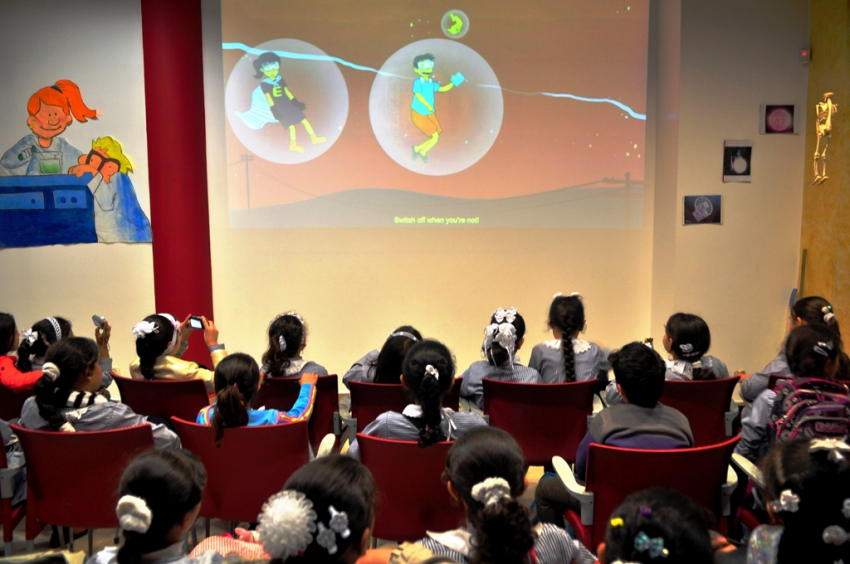
For the first time ever, the Science Film Festival (SFF) launched by the Goethe Institute in 2005 in south-east Asia was held in three Arab countries: Palestine, Jordan, and the United Arab Emirates. The Festival aims at promoting science literacy.
The Festival was hosted in Palestine by the A. M. Qattan Foundation through the Walid and Helen Kattan Science Education Project - the Qattan Centre for Educational Research and Development (QCERD) in the West Bank, and the Qattan Centre for the Child (QCC) in Gaza, in cooperation with the Goethe Institute and the French Institute. The Festival took place between 10-14 November in Ramallah, Gaza, and 11 other Palestinian villages and cities, including Jerusalem and Nazareth.
In the United Arab Emirates, SFF was part of the 2013 Abu Dhabi Science Festival from 14-23 November, and was hosted by the Children´s Museum in Jordan from 17-23 November.
SFF included screening of films that explain different scientific phenomena to a broad audience, followed by interactive science activities related to the films topics. All films were either dubbed or subtitled into Arabic.
The Foundation saw the Festival as a way to improve the quality of science teaching in Palestinian schools. To achieve this, it worked with Teachers’ Forums in selecting the films, designing interactive science activities around its theme of “Energy and Sustainability”, and trained a select group of teachers and students to implement the activities. Realizing the special link between science films and education, especially that the former has become one of the primary tools in disseminating scientific and technological knowledge, as well as developing environmental awareness, all in an accessible and entertaining approach, the Foundation plans this as a regular annual activity, and welcomes new partners to join the Festival. The films acted as a catalyst for very lively discussions and debates among the thousands children and adults who attended the Festival.
This year’s festival theme was “Energy and Sustainability”; many of the films tackled this topic. The Foundation partnered with a distinguished group of science teachers in selecting the films, and in building interactive science activities for the audience.
In partnership with teachers’ forums in Palestine, the Foundation trained a group of teachers and students who run the festival activities, on how to engage the audience in an interactive way. The Foundation also worked to build partnerships with local community institutions to support the festival activities.
Alongside SFF, the Science Days Palestine (SDP) 2013 was implemented in partnership with the Franco-German Cultural Centre. SDP included Science Snacks, an array of simple interactive science experiments for children and parents that aim to encourage an interest in every day science.
QCC also participated in SDP for the fourth year in a row, by hosting interactive activities based around astronomy. Activities such as storytelling, drama, and Xbox games were utilized to learn about astronomy.
Science Days activities included Science Cafes, giving the audience the opportunity to discuss science topics with experts from the L’Atelier des Jours à Venir. In addition the Mobile Library drove around showing science films and sharing science-related books, in order to reach schools in remote and deprived areas.
The Institut Français brought over a team of archaeologists from the French mobile archaeological lab, which hosted activities for children on excavating old pottery and learning about ancient civilisations by studying these remnants. This activity was held at QCC in Gaza.
SDP and the SFF were held over four days in several towns and villages: Ramallah, in partnership with the Al-Kasaba Theatre; Nilin, with the Teachers Centre, which is affiliated with QCERD; Birzeit, with the Al Nayzak Organisation; Qalqilya, with the Intellectuals Forum and the municipal Zoo; Jenin, with the Yabud and Jenin Teachers Forum and Jenin Cinema; Hebron, with teacher forums in Dora, Halhoul and Ithna and the Korean-Palestinian Centre; Jericho, with the Child Centre and Zubaydat Secondary School-Ministry of Education; Bethlehem, with Dar Annadwa, Dar Issaf Nashashibi/Dar Al-Tifel Al-Arabi, and Yabous Cultural Centre; Nazareth, with the Nazareth Teachers Forum and Childhood Centre; Nablus, with the Child Cultural Centre; and all of Gaza’s provinces.
